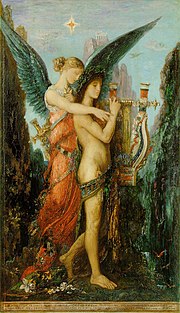 Lee Siegel, writing in the Wall Street Journal, muses on the role of the muse in Art, and suggests that, in modern times, the muse has vanished. (The Wall Street Journal? When did that start having articles worth reading?)
Lee Siegel, writing in the Wall Street Journal, muses on the role of the muse in Art, and suggests that, in modern times, the muse has vanished. (The Wall Street Journal? When did that start having articles worth reading?)Where Have All the Muses Gone?
"Whatever happened to the Muse? She was once the female figure -- deity, Platonic ideal, mistress, lover, wife -- whom poets and painters called upon for inspiration. Thus Homer in the Odyssey, the West's first great work of literary art: "Sing to me of the man, Muse, of twists and turns driven time and again off course." For hundreds of years, in one form or another, the Muse's blessing and support were often essential to the creation of art."
--the article's worth perusing just for the art show of muses from Rembrandt through Picasso, if nothing else.
Are muses still alive? Do you have a muse?
In any case, “Muse” is also the name of the Lit Center’s magazine! So we can celebrate the Muses right here.

4 comments:
I've been thinking a lot lately about the concept of the muse in the context of male power, objectification of women, this kind of expectation we have that women remain chaste or pure emblems of idea or ideal.
Yet I don't think all muses or all muse worshipers fall into this context in a bad way--muses can happen in benevolent contexts as well.
But I think there has been a history of women shutting up, women closing down, women throwing up, and the phenomenon of muse-worshipers has had a role in this.
I'd really like to clarify the connotations on this--I don't think we perpetrate abuse purposefully. How we are raised, the norms of society--all are involved.
When we live in a society that rewards objectifying women, it's normal to not even identify the objectification--it's not even visible--it doesn't even hit the radar of consciousness. It's not a crime. It can't be a crime if you aren't aware that it's a crime. But of course this poses a bootstrap problem.
I oft feel that we are born mired in racist and sexist circumstance, and that part of learning involves learning to recognize what we're mired in. So I'm not angry about racist and sexist thought.
Take R. Crumb as an example:
When I was little, I thought he was really cool, really swell. But today I'm really uncomfortable with his work. I think it is legitimate art--that it deals with uncomfortable topics of the subconscious. But it's no longer entertaining to me.
Or take the movie, "Weird Science." I recently re-watched it. The characters in the movie use the word 'fag.' How hurtful. Yet I didn't remember this when I was a kid. And yet isn't this what kids do? So what's wrong with the movie portraying what really happens? I guess tone matters--the tone and context of the movie condoned the insult. And it's rife with objectification and ill nuance.
For this reason I don't think it's nice to get angry at people for being ignorant, because coming out of ignorance is a learning process.
I want to clarify that I'm not angry about the use of the word 'muse,' and I think it's OK to use this word and to discuss this word.
More thoughts:
I'm having difficulty with the concept of people as meditation objects--muses. But I think they just happen, and that we can just acknowledge and celebrate it rather than condemn it. I think it's important to try not to idealize people--perhaps we can construct a more modern version of the muse, one with flaws, a more palatable version.
I think the recent superhero move--"The Watchmen"--deals with this--what it means to be a hero in an age of deconstruction. The Watchmen's heroes are very flawed.
OF COURSE MUSES ARE STILL ALIVE. geez.
Post a Comment